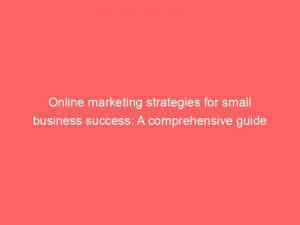- online marketing strategies for small business
- Create Valuable And Informative Content
- Share Content On Website And Social Media
- Utilize Email Marketing To Reach Interested Customers
- Invest In Online Advertising For Wider Reach
- Monitor And Analyze Results With Google Analytics
- Focus On Branding, Buyer Personas, And Website Optimization
- Use Social Media Marketing And Collaborate With Influencers
- Implement SEO Strategies For Higher Google Ranking
In today’s digital age, online marketing strategies have become paramount for small businesses to succeed and thrive in a competitive market. With the power of the internet at our fingertips, the possibilities are endless.
Whether it’s creating compelling content to engage your target audience, utilizing social media and influencers to spread your message, or employing SEO techniques to improve your website’s visibility, the world of online marketing offers a multitude of opportunities. By harnessing the potential of email marketing, online advertising, and analyzing data-driven results, small businesses can effectively promote their brand, engage with prospects, and ultimately boost their success.
Join us as we delve into the world of online marketing strategies for small businesses, and discover the keys to creating a thriving digital presence.
| Item | Details |
|---|---|
| Topic | Online marketing strategies for small business success: A comprehensive guide |
| Category | Ads |
| Key takeaway | In today's digital age, online marketing strategies have become paramount for small businesses to succeed and thrive in a competitive market. |
| Last updated | December 27, 2025 |
online-marketing-strategies-for-small-business">online marketing strategies for small business
Online marketing strategies for small businesses involve utilizing various digital tools and platforms to promote their products or services and reach a wider audience. Creating valuable and informative content targeted at the specific audience is crucial.
Sharing this content on the business website and social media platforms allows for wider visibility and engagement. Email marketing is an effective way of directly reaching interested customers.
Online advertising helps in expanding the reach and attracting more potential customers. Monitoring and analyzing results using tools like Google Analytics provide insights for optimization.
Focusing on branding, buyer personas, and website optimization enhances the overall marketing strategy. Social media marketing and collaborating with influencers boost visibility and credibility.
Implementing SEO strategies helps to improve Google ranking. Building a comprehensive social media strategy and engaging with prospects further strengthens the marketing efforts.
Offering incentives and coupons through newsletters or landing pages encourages customer loyalty. Lastly, leveraging user-generated content and developing a referral program can drive organic growth, and advertising with the local chamber of commerce helps gain local visibility.
By implementing these strategies, small businesses can effectively promote their products or services online.Key Points:
- Utilize digital tools and platforms to promote products/services and reach a wider audience
- Create valuable and informative content targeted at specific audience
- Share content on website and social media for wider visibility and engagement
- Use email marketing to directly reach interested customers
- Implement online advertising to expand reach and attract potential customers
- Monitor and analyze results using tools like Google Analytics for optimization
Sources
https://blog.hubspot.com/marketing/small-business-marketing-guide
https://www.paypal.com/us/brc/article/promote-small-business-online
https://www.forbes.com/advisor/business/social-media-marketing/
https://www.nerdwallet.com/article/small-business/online-marketing-for-small-business
Check this out:
💡 Pro Tips:
1. Utilize video marketing: In addition to creating valuable content, incorporate video into your online marketing strategy. Videos can be engaging and shareable, helping to increase your reach and attract new customers.
2. Leverage customer reviews and testimonials: Encourage satisfied customers to leave reviews or provide testimonials for your small business. Display these on your website and social media platforms to build trust with potential customers.
3. Collaborate with other small businesses: Partnering with complementary businesses can help expand your reach and attract new customers. Consider cross-promotions, joint marketing campaigns, or even hosting events together to increase visibility.
4. Offer personalized experiences: Tailor your marketing efforts and offers to specific customer segments. Use customer data and insights to create personalized experiences that resonate with your target audience and increase conversion rates.
5. Focus on local SEO: Optimize your online presence for local searches by including location-specific keywords, updating your Google My Business profile, and listing your business in relevant online directories. This can help attract customers who are specifically looking for businesses in your area.
Create Valuable And Informative Content
In the world of online marketing, content is king. Small businesses must focus on creating valuable and informative content that resonates with their target audience.
By providing relevant and helpful information, businesses can establish themselves as industry experts and build trust with potential customers. This can be achieved through blog posts, articles, videos, infographics, and other forms of content.
When creating content, it’s important to consider the needs and interests of your target audience. Conduct thorough research to understand the problems and challenges they face, and then provide solutions and insights through your content.
This will not only attract the attention of your audience but also position your business as a go-to resource in your industry.
Remember:
– Quality over quantity: Focus on creating high-quality content that adds value to your audience’s lives. – Stay relevant: Keep your content up-to-date and in line with current trends and industry developments.
- Use a mix of formats: Experiment with different content formats like videos, podcasts, and interactive content to keep your audience engaged.
Share Content On Website And Social Media
Creating great content is only half the battle; you also need to promote it effectively. Sharing your content on your website and social media platforms is crucial to maximize its reach and impact.
Your website should serve as a central hub of information for your business, where visitors can find all your valuable content in one place.
When sharing content on social media, tailor your messaging to each platform and engage with your audience. Encourage them to share and comment on your content, and respond to any feedback or inquiries promptly.
This will not only increase your reach but also help foster a sense of community and brand loyalty.
Key tips:
– Include social sharing buttons on your website to make it easy for visitors to share your content. – Use relevant hashtags to increase your content’s visibility on social media platforms.
- Analyze the performance of your content on different platforms and adjust your sharing strategy accordingly.
Utilize Email Marketing To Reach Interested Customers
While social media is a powerful tool, it’s important not to overlook the effectiveness of email marketing. Building an email list allows you to directly reach out to a targeted audience who have expressed interest in your business.
It also provides a more personal and direct communication channel, allowing you to nurture leads and convert them into customers.
When implementing an email marketing strategy, focus on providing value to your subscribers. Send them informative newsletters, exclusive discounts, and personalized content that meets their specific needs.
Segment your email list based on demographics, behavior, and preferences to ensure you send relevant content to each recipient.
Pro tips:
– Use compelling subject lines and preview text to increase email open rates. – Incorporate strong call-to-actions (CTAs) in your emails to encourage actions from your subscribers.
Latest benchmarks updated for programmatic buyers.
- Regularly analyze the performance of your email campaigns to identify areas for improvement.
Invest In Online Advertising For Wider Reach
To reach a larger audience beyond your organic reach, investing in online advertising is essential. Platforms like Google Ads, Facebook Ads, and Instagram Ads allow you to target specific demographics, interests, and behaviors, ensuring that your ads are seen by the right people.
When designing your online ads, make sure they are visually appealing and relevant to your target audience. Craft compelling copy that highlights the unique value propositions of your business.
Continuously monitor and optimize your ad campaigns to ensure you are getting the best results for your investment.
Top tips:
– Set clear goals and objectives for your online advertising campaigns. – Use retargeting ads to reach people who have previously shown interest in your business.
- Monitor your ad campaigns regularly and adjust your targeting and messaging based on performance.
Monitor And Analyze Results With Google Analytics
To gauge the effectiveness of your online marketing strategies, it’s crucial to monitor and analyze your results. Google Analytics is a powerful tool that provides valuable insights about your website’s performance, user behavior, and conversions.
By tracking key metrics, you can identify areas for improvement and make informed decisions to optimize your marketing efforts.
Regularly review your website’s traffic sources, bounce rate, conversion rate, and other relevant metrics. Use this data to identify the most effective channels and tactics, and allocate your resources accordingly.
Additionally, set up goals and conversion tracking in Google Analytics to measure the success of specific marketing campaigns or actions.
Insider tips:
– Create custom reports and dashboards in Google Analytics to track metrics that are most relevant to your business. – Use Google Analytics’ attribution models to understand the impact of different marketing channels and touchpoints on conversion.
Focus On Branding, Buyer Personas, And Website Optimization
In the competitive online landscape, building a strong brand is crucial for small businesses. A well-defined brand helps differentiate your business from competitors and creates a memorable impression on your target audience.
Develop a compelling brand story and consistently communicate it through your website, content, and social media presence.
Additionally, create detailed buyer personas to better understand your ideal customers. This will help you tailor your marketing messages and content to resonate with their needs, pain points, and aspirations.
Don’t forget to optimize your website for both search engines and user experience. A fast-loading, mobile-friendly, and visually appealing website will enhance your online visibility and user engagement.
Invaluable advice:
– Conduct market research and competitor analysis to identify gaps and opportunities in your industry. – Consistently review and refine your branding strategy to ensure it aligns with your target audience’s preferences and current market trends.
- Conduct regular website audits to identify and fix any technical issues that may hinder user experience or search engine indexing.
Use Social Media Marketing And Collaborate With Influencers
Social media is a powerful tool for small businesses to engage with their target audience, build brand awareness, and drive traffic to their website. Create a comprehensive social media strategy that aligns with your business goals and target audience.
Identify the social media platforms that your target audience uses most frequently and focus your efforts on those platforms.
Engage with your audience by actively responding to comments, messages, and mentions. Share valuable content, behind-the-scenes peeks, and customer testimonials to keep your audience excited and engaged.
Collaborating with influencers in your industry is also a great way to expand your reach and credibility.
Top-notch tips:
– Conduct social media audits to identify the platforms where your audience is most active and engaged. – Use tools like social media scheduling software to plan and automate your social media content sharing.
- Research and carefully select influencers whose values align with your brand and have a loyal following.
Implement SEO Strategies For Higher Google Ranking
Search Engine Optimization (SEO) is the process of improving your website’s visibility on search engine results pages. By implementing effective SEO strategies, small businesses can increase their organic traffic and improve their ranking on search engine platforms like Google.
Start by conducting thorough keyword research to identify the terms and phrases your target audience is searching for. Incorporate these keywords into your website’s content and metadata.
Optimize your website’s structure, including title tags, meta descriptions, headings, and alt tags. Focus on creating high-quality backlinks from trustworthy and authoritative websites.
Key takeaways:
– Regularly review and update your site’s on-page SEO factors like internal linking, site speed, and mobile optimization. – Create high-quality, shareable content that naturally attracts backlinks from other websites.
- Stay up to date with the latest SEO trends and algorithm changes to ensure your strategies remain effective.
Buy Traffic • Performance Marketing Tips • Self-Serve DSP Platform • Advertising Platform for Marketers











